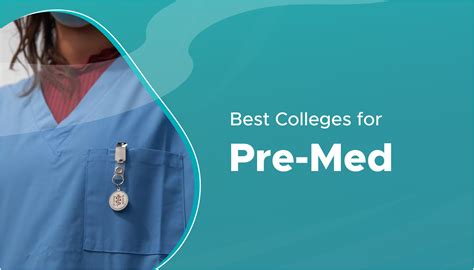
Deciding on the right college for your pre-medical studies can be a daunting task. You’re not alone in your quest to find an institution that supports your academic and professional aspirations. Many students face a similar predicament, wondering which colleges offer the strongest pre-med programs and how to select the one that aligns with their individual goals. In this comprehensive guide, we’ll delve into the factors you should consider when choosing a pre-med college, including curriculum, faculty, research opportunities, and clinical experience. We’ll also explore the admissions requirements, financial aid options, and support services available at top pre-med colleges in the United States. Join us as we navigate the complexities of choosing the best college for your pre-med journey, empowering you to make an informed decision that sets you on the path to medical school success.
Factors to Consider When Choosing a Pre-Med College
Choosing the right college for your pre-med journey is a critical decision that can significantly impact your future success. Consider the following factors to make an informed choice:
Academic Reputation and Rigor:
Look for colleges with strong science and pre-med programs recognized for their academic excellence. Check university rankings and course curricula to assess the quality of education.
Pre-Med Advising and Support:
A dedicated pre-med advising office provides guidance, support, and mentorship throughout your pre-med journey. Look for colleges with experienced advisors who can help you navigate course selection, research opportunities, and the application process.
Research Opportunities and Faculty Support:
Engaging in undergraduate research is essential for building a strong foundation for medical school. Consider colleges with active research programs and faculty who actively involve undergraduate students in their projects.
Clinical Experience and Shadowing Programs:
Getting hands-on experience in a clinical setting is crucial for aspiring physicians. Look for colleges that offer opportunities for shadowing physicians, volunteering in hospitals, or participating in summer clinical programs.
Location and Campus Culture:
The location and campus culture can also influence your pre-med experience. Consider colleges in areas with access to medical facilities and a vibrant pre-health community. A supportive and inclusive campus environment can contribute to your overall well-being and success.
Cost and Financial Aid:
The cost of college is an important factor to consider. Determine the total cost of attendance, including tuition, fees, and living expenses. Explore financial aid options such as scholarships, grants, and loans to make your education more affordable.
Top Pre-Med Colleges in the United States
Based on the factors discussed above, here is a list of some of the top pre-med colleges in the United States:
| Rank | College | Location |
|---|---|---|
| 1 | Johns Hopkins University | Baltimore, MD |
| 2 | University of California, Berkeley | Berkeley, CA |
| 3 | Stanford University | Stanford, CA |
| 4 | University of Pennsylvania | Philadelphia, PA |
| 5 | Harvard University | Cambridge, MA |
These colleges consistently rank highly for their pre-med programs, offering exceptional academics, research opportunities, clinical experiences, and student support.
Pre-Med Curriculum and Coursework
Pre-med students typically complete a rigorous curriculum that includes:
Biology:
This core course provides a foundation in cellular and molecular biology, genetics, and evolution.
Chemistry:
Inorganic, organic, and biochemistry courses cover fundamental chemical principles and their applications in biological systems.
Physics:
Courses in mechanics, electricity, and optics provide a basis for understanding physiological processes.
Mathematics:
Calculus and statistics courses develop problem-solving and analytical skills essential for medical research and practice.
Social Sciences:
Pre-med students also take courses in psychology, sociology, and ethics to gain a holistic perspective on healthcare.
Elective Courses:
Students can choose elective courses in areas such as human physiology, immunology, or public health to explore their interests and prepare for future medical careers.
Research Opportunities and Faculty Support
Undergraduate research is a valuable experience that enhances your understanding of scientific principles and prepares you for medical school. Pre-med colleges offer:
Research Labs:
Faculty-led research labs provide opportunities for students to participate in cutting-edge scientific investigations.
Mentorship Programs:
Experienced faculty mentors guide students through research projects, providing support and guidance.
Summer Research Fellowships:
Funded fellowships allow students to dedicate summer breaks to intensive research experiences.
Research Symposia and Conferences:
Colleges host events where students can present their research findings and network with professionals in the field.
Academic Partnerships:
Collaborations with medical institutions provide access to research facilities and opportunities to interact with medical professionals.
Dedicated Research Centers:
Some colleges establish specialized research centers that foster interdisciplinary collaborations and support student research.
Clinical Experience and Shadowing Programs
Clinical experiences are crucial for developing the skills and empathy required for a successful medical career. Pre-med colleges offer:
Hospital Shadowing Programs:
Students shadow physicians in various clinical settings to observe patient care and gain insights into the healthcare profession.
Medical Volunteer Programs:
Volunteering in hospitals, clinics, or community health centers provides hands-on experience in patient interaction and healthcare delivery.
Clinical Skills Courses:
Structured courses teach practical clinical skills such as patient history taking, physical examinations, and basic medical procedures.
Internship Programs:
Some colleges offer paid or unpaid internships in clinical settings, providing extended opportunities for patient care experience.
Clerkships:
As part of their curriculum, some colleges arrange clerkship rotations in hospitals, allowing students to work with physicians and participate in patient care.
Community Health Programs:
Colleges collaborate with community organizations to provide students with opportunities to engage in outreach and public health initiatives.
Admissions Requirements and Selectivity
Admission to top pre-med colleges is highly competitive. Requirements include:
High School GPA:
A strong academic record in high school is essential, with a focus on STEM subjects.
Standardized Test Scores:
High scores on the SAT or ACT are required, demonstrating college readiness in math and English.
Extracurricular Activities:
Involvement in science clubs, research projects, or community service demonstrates well-roundedness and dedication to healthcare.
Personal Statement:
A compelling personal statement that articulates your passion for medicine and showcases your unique qualities is crucial.
Letters of Recommendation:
Strong letters of recommendation from teachers, counselors, or mentors who can attest to your academic abilities and character.
Interview:
Some colleges conduct interviews to assess the applicant’s interpersonal skills, motivation, and fit for the program.
Preparing for the MCAT Exam
The Medical College Admission Test (MCAT) is a standardized exam required for admission to medical school. Pre-med colleges offer:
MCAT Preparation Courses:
Pre-med programs often offer official or affiliated MCAT preparation courses to help students prepare for the exam.
Practice Exams and Resources:
Colleges provide access to mock exams, practice questions, and online resources to strengthen MCAT preparation.
MCAT Study Groups:
Student-led or faculty-facilitated study groups provide collaboration and support for MCAT preparation.
Individual Tutoring:
Some colleges offer individual tutoring or access to university-wide tutoring centers for additional MCAT support.
Pre-Health Advising:
Pre-health advisors guide students through the MCAT preparation process, providing encouragement and guidance.
Research Opportunities:
Engaging in research can enhance your understanding of scientific concepts tested on the MCAT.
Financial Aid and Scholarships
The cost of pre-med education can be significant. Colleges offer various financial aid options to make education more accessible:
Scholarships:
Merit-based or need-based scholarships are awarded to students based on academic achievements, financial need, or other criteria.
Grants:
Federal or state grants provide financial assistance to eligible students, typically based on financial need.
Federal Loans:
Direct or indirect federal loans are available to students who meet specific criteria and can provide low-interest loans to cover educational expenses.
Institutional Aid:
Colleges may provide their own financial aid programs, including tuition waivers, work-study programs, or emergency assistance.
External Funding:
Students can explore external scholarship opportunities offered by organizations, foundations, or government agencies.
Financial Planning:
Pre-health advisors can assist students in developing financial plans and exploring loan repayment options.
Pre-Med Advising and Support Services
Pre-med colleges provide comprehensive advising and support services to guide students throughout their journey:
Academic Advising:
Dedicated pre-health advisors assist students with course selection, major exploration, and overall academic planning.
Career Counseling:
Career counselors help students explore healthcare career paths, prepare for medical school applications, and develop professional skills.
Peer Mentorship Programs:
Upper-level pre-med students or

